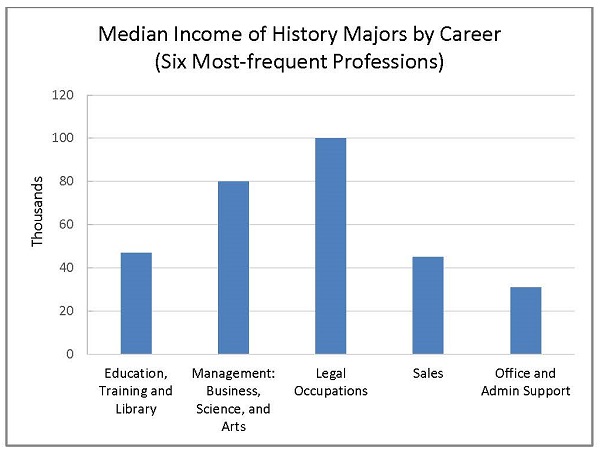Careers With A History Major

Choosing a major can be a daunting task for many students, as it often signifies a pivotal decision that shapes their future career paths. For those intrigued by the study of the past, a history major offers a unique and enriching educational journey. But what career options does it unlock? This article delves into the diverse world of careers that await history majors, showcasing the practical applications of historical knowledge and the skills that make history graduates highly sought-after across various industries.
Unveiling the World of Opportunities: Careers for History Majors

The study of history is more than just memorizing dates and events; it equips students with a profound understanding of the human condition, societal evolution, and the intricate web of causes and effects that shape our world. This multifaceted discipline fosters critical thinking, analytical skills, and a unique perspective on problem-solving. So, what doors does a history major open for aspiring professionals? Let’s explore the myriad of career paths that await.
The Academic Arena: History Teachers and Professors
One of the most obvious career paths for history majors is academia. As a history teacher or professor, you have the opportunity to inspire and educate the next generation, nurturing a deep appreciation for the past. Whether it’s sharing the tales of ancient civilizations with elementary school students or guiding undergraduate and graduate students through the complexities of historical research, the academic route offers a fulfilling career journey.
To embark on this path, a strong academic foundation is essential. This often involves pursuing a Master’s or even a Ph.D. in History, specializing in a specific era or geographical region. The journey may be rigorous, but the rewards are immense: the satisfaction of imparting knowledge, contributing to historical research, and shaping the minds of future historians and scholars.
The World of Research and Preservation: Archivists and Curators
Beyond the classroom, history majors can play a crucial role in preserving and presenting our collective heritage. Archivists and curators are the guardians of our historical artifacts, documents, and artworks. They ensure the proper preservation, organization, and accessibility of these treasures, making our shared history available to researchers, students, and the public.
The work of archivists and curators involves meticulous research, organization skills, and a deep respect for historical artifacts. They may work in various settings, including museums, libraries, government archives, or even private collections. The role often requires a blend of historical knowledge, technological proficiency, and an eye for detail, ensuring the accurate representation and preservation of our past.
| Career | Average Salary |
|---|---|
| History Teachers (Secondary Education) | $60,000 - $75,000 |
| History Professors (University Level) | $70,000 - $120,000 |
| Archivists | $45,000 - $65,000 |
| Curators (Museums) | $50,000 - $80,000 |

Unveiling the Past: Historical Researchers and Consultants
The skills acquired through a history major are highly transferable and sought-after in various industries. Historical researchers and consultants, for instance, play a pivotal role in uncovering the past to inform present-day decisions. They may work on projects ranging from legal disputes requiring historical context to corporate clients seeking to understand the historical impact of their industry or brand.
This career path often involves extensive research, analysis, and report writing. Historical researchers might work with a variety of sources, including archives, interviews, and historical records. The ability to synthesize information, draw insights, and present findings in a clear and compelling manner is crucial in this role. It offers a unique blend of historical knowledge and practical application, making it an appealing option for history majors seeking a dynamic career.
Preserving Heritage: Heritage Conservation and Management
History majors with a passion for preserving and managing historical sites and landmarks can find their niche in heritage conservation and management. This field involves the conservation, restoration, and promotion of historical sites, buildings, and cultural landscapes. It requires a deep understanding of historical contexts, architectural styles, and the ability to balance preservation with contemporary needs.
Professionals in this field may work for government agencies, non-profit organizations, or private companies. They play a crucial role in ensuring the longevity of our historical heritage, making it accessible to the public, and educating visitors about the significance of these sites. It’s a career that blends historical knowledge with practical conservation skills, offering a unique and impactful contribution to society.
Navigating the Legal Landscape: Legal Historians and Researchers
The legal field offers intriguing opportunities for history majors, particularly in the realm of legal history and research. Legal historians delve into the past to understand the evolution of laws, legal systems, and their societal impact. They may work with law firms, government agencies, or academic institutions, providing historical context and research for legal cases, policy development, or scholarly publications.
This career path requires a strong foundation in both history and law. Legal historians often possess advanced degrees in history or law, or a combination of both. They must navigate complex legal and historical research, analyze primary sources, and present their findings in a clear and concise manner. It’s a specialized field that bridges the gap between history and law, offering a unique perspective on the legal landscape.
Storytelling through Media: History in Journalism and Film
History majors with a flair for storytelling can find exciting opportunities in journalism and film. In these fields, historical knowledge is a powerful tool for creating engaging content, be it through written articles, documentaries, or feature films. Historians in these industries play a crucial role in ensuring historical accuracy, providing context, and bringing the past to life for a modern audience.
In journalism, history majors can contribute to news outlets, magazines, or online publications, covering historical events, reviewing historical books, or providing expert commentary. In the film industry, they may work as historical consultants, ensuring that historical films and documentaries are factually accurate and engaging. This career path combines a passion for history with the creative and technical aspects of media production, offering a unique and rewarding journey.
The Business World: History in Corporate Strategy and Consulting
The skills honed through a history major are highly valued in the corporate world, particularly in strategic planning and consulting. History majors bring a unique perspective to business, understanding the long-term trends, patterns, and lessons from the past. They can contribute to corporate strategy, market research, and brand development, offering insights that inform present-day decisions.
In the business world, history majors may work as consultants, providing historical context and analysis for clients. They might also work in-house, contributing to marketing teams, helping to develop branding strategies, or working on corporate history projects. This career path showcases the versatility of a history major, demonstrating how historical knowledge can be applied to inform and enhance business practices.
The Future of History Majors: Emerging Opportunities
As our world becomes increasingly interconnected and digital, new opportunities are emerging for history majors. The rise of digital humanities, for instance, offers a unique blend of history and technology, allowing historians to engage with new media, digital archives, and online platforms. This field involves the use of digital tools for historical research, analysis, and presentation, offering a modern twist to traditional historical studies.
Additionally, the growing focus on sustainability and environmental history presents new avenues for history majors. By understanding the historical context of environmental issues, historians can contribute to policy development, education, and public awareness. This emerging field highlights the relevance of history in addressing contemporary challenges, offering a unique and impactful career path.
What are the key skills that history majors develop, and how can they be applied in the job market?
+History majors develop a unique set of skills, including critical thinking, analytical abilities, research proficiency, and a deep understanding of societal dynamics. These skills are highly transferable and can be applied in various fields. For instance, critical thinking and analysis are valuable in consulting, research, and strategic planning roles. The ability to research and synthesize information is crucial in fields like journalism, legal research, and historical preservation. Understanding societal dynamics can contribute to fields like marketing, policy development, and social research.
Are there specific career paths that require further education after a history major?
+Yes, certain career paths may require further education. For instance, becoming a history teacher or professor often requires a Master's or Ph.D. in History. Similarly, careers in law, such as legal historians or researchers, typically require a law degree. However, many other career paths, such as historical consulting, journalism, or corporate strategy, can be pursued with a bachelor's degree in history, leveraging the skills and knowledge gained during the undergraduate program.
How can history majors stand out in a competitive job market?
+History majors can stand out by highlighting their unique skill set and demonstrating how their historical knowledge can be applied in practical ways. This might involve showcasing research projects, internships, or extracurricular activities that demonstrate their ability to apply historical thinking to real-world problems. Additionally, developing strong writing and communication skills, as well as proficiency in digital tools, can set history majors apart in a competitive job market.
In conclusion, a history major opens doors to a diverse range of careers, each offering a unique opportunity to engage with the past and apply historical knowledge in meaningful ways. Whether it’s inspiring students as a history teacher, preserving our heritage as an archivist or curator, or contributing to corporate strategy, the skills and insights gained through a history major are highly valued across industries. As we continue to explore and learn from our past, the role of history majors in shaping our future becomes increasingly significant.



